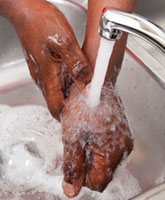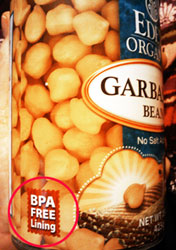Produced in quantities of about six billion pounds each year worldwide, BPA is one of the most widely used chemicals of all time. Present in 93% of all Americans, scientists studying BPA have hypothesized the major route of human exposure is through food, as BPA is used as a liner in nearly all canned food and beverages. Our study, “On the Money: BPA in Dollar Bills and Receipts” indicates that skin absorption from thermal paper receipts with unbound BPA may lead to exposure at levels equivalent to exposure from food sources.
During the past decade, an explosion of research has explored the connections between BPA exposure—particularly before birth and in early childhood—and the health problems that are increasingly afflicting U.S. residents. Researchers have linked developmental exposure to BPA to reproductive harm, increased cancer susceptibility, and abnormalities in brain development and fat metabolism. “Our findings demonstrate that BPA cannot be avoided, even by the most conscious consumer,” said Erika Schreder, Staff Scientist at the Washington Toxics Coalition and lead author of the “On the Money” report. “This unregulated use of large amounts of BPA is having unintended consequences, including exposure to people when we touch receipts.”
The Washington Toxics Coalition created this simple tip sheet to help people reduce their exposure to BPA.
 Tips For Reducing Exposure to BPA
Tips For Reducing Exposure to BPA
- Refuse a receipt when you can.
- Store your receipts separately, such as in a small envelope, in your wallet or purse.
- Wash your hands after handing receipts or money.
- Keep receipts away from young children.
Other ways to minimize BPA exposure include:

- Limit your intake of canned foods. For some canned foods, choices in BPA- free cans are available from Eden Foods.
- Choose alternatives to polycarbonate plastic for baby bottles and sports water bottles. For babies, glass and cloudy plastic bottles are better choices. For sports bottles, the best choice is stainless steel.
- Choose powdered rather than liquid infant formula. If you do need liquid formula, use BPA-free containers.



